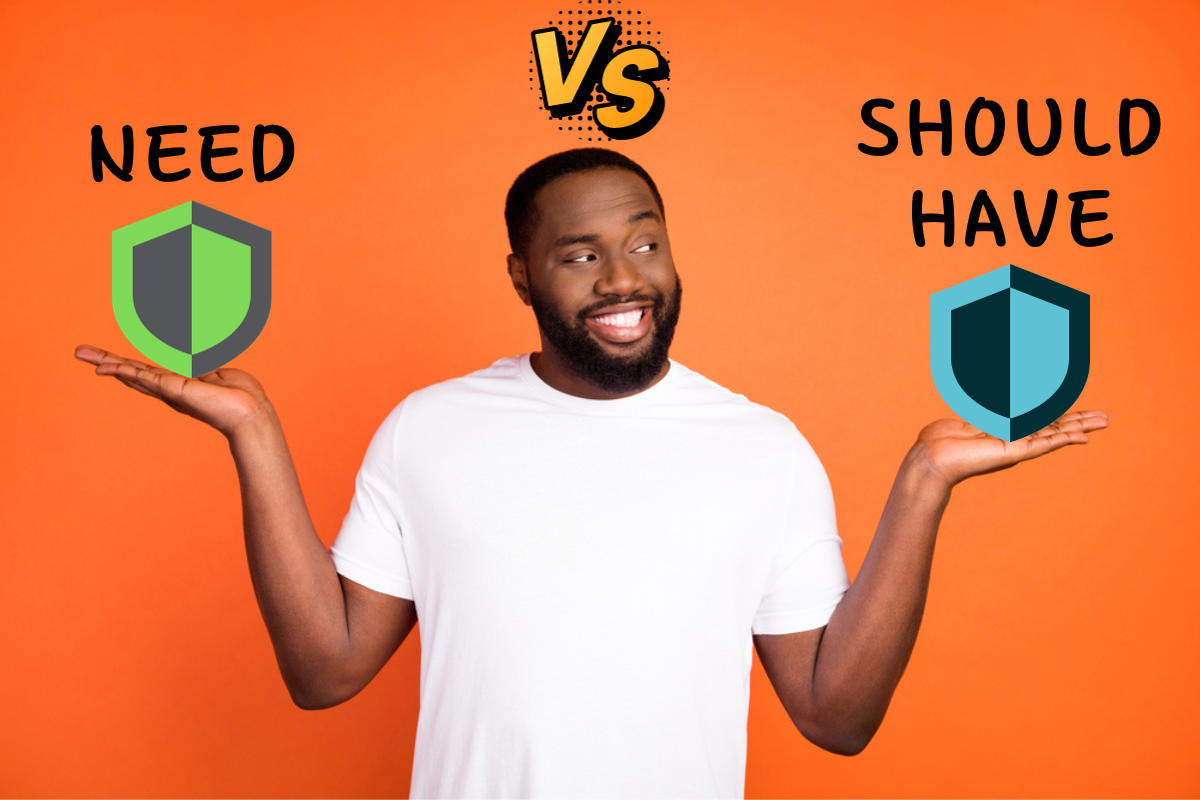
- Be named in an employment lawsuit
- Lose a critical member of the team
- Have someone in upper management make bad financial decisions
- 1.) Understand what policy types are available before you start shopping for insurance.
- 2.) Work with an insurance broker or agent who can advise and answer your questions.

Required insurance for your business is easier to shop for because, well, you don’t really have a choice! Some states mandate certain insurance policies. Other times, the entities you utilize for your business have contracts in place that require you to carry certain insurance types – entities such as banks, vendors, and landlords.
If you sell online, landlords and banks may not be entities you do business with. However, some online platforms (Amazon, for example) have certain insurance requirements you need to follow. Regardless of whether you sell online or in a physical store, you will need to do research on any insurance requirements associated with your business type. You can also speak with an insurance broker or agent to help guide you through this.
The tricky part of shopping for insurance is deciding which “should have” policies to invest in. Every business is unique in that it doesn’t operate exactly like any other business. So, you’ll need to scope out what type of vulnerabilities your company is prone to and use those as a guide.
When researching, you will come across a lot of different insurance opportunities. It’s all too common for entrepreneurs to seek fundamental and overarching insurance policies, such as cyber insurance or the ones listed here. While these policies are undoubtedly important, they shouldn't overshadow the significance of exploring more obscure coverage options.
While rarely mandatory, the following three insurance types are certainly ones you should understand before binding insurance coverage.
What is Employment Practices Liability Insurance (EPLI)?
EPLI is a type of insurance coverage designed to protect your company against liability claims brought on by employees or former employees. It covers legal costs and restitution when employment-related disputes arise.
The most frequent types of claims covered under EPLI are wrongful termination, discrimination, sexual harassment, bullying, and retaliation. Other types of claims it may cover include defamation, invasion of privacy, refusal toward career advancement, and negligence.

EPLI policies cover your company when someone within your organization makes an employment-related claim that falls into the specified scope of your EPL coverage. Some insuring agreements even cover claims made by independent contractors you have hired.
EPLI policies work a little differently than other insurance types in that they typically have “shrinking limits." Virtually all insurance policies have limits: A policy limit refers to the maximum amount of money your insurance company will pay out for an insurance policy claim.
A policy with shrinking limits means that the original monetary limit of your coverage can change. For example, if an employee sues your company for a hostile work environment, the money your insurance carrier pays for your legal defense reduces your EPLI limit. Should the plaintiff win the settlement or judgement against you, there is now less money available from your policy to pay out the money owed. If the total cost of legal fees and the judgement owed exceeds your policy's coverage limit, you will likely need to pay the difference out-of-pocket.
It is important to also note, in some cases, your EPLI policy won't cover defense costs until you've paid your deductible or retention.
Why can’t I use my general liability insurance policy if an employee sues me?
Many business owners make the mistake of thinking their general liability insurance policy will cover all claims, including those that lead to litigation. That’s a misconception.
While both policy types provide protection against liability claims, they cover different risks. In colloquial terms, think of general liability insurance (GLI) as protecting your business from outside friction and EPLI as protecting your business from inside friction. Think of it like this: if one of your employees were to sue your company for unethical practices, that would be governed under your EPL policy. If a customer or client were to sue your company for unethical practices, that would be governed under your GL policy.
Another contrasting factor is that, during lawsuits, a general liability policy usually will pay for your legal defense without factoring in your policy limits toward potential settlements or judgments.
Aside from the EPLI benefits mentioned previously, here are a few other things employment practices liability coverage can offer that general liability coverage cannot:
- Regulatory compliance assistance: EPLI policies may offer resources and assistance to help businesses comply with employment laws and regulations. This can include access to legal advice, HR best practices, and training materials.
- Maintaining a positive work environment: EPLI can help businesses address employment disputes professionally, which may contribute to maintaining a positive work environment and protecting the company's reputation.
As a final note, while an EPLI policy is available as stand-alone coverage, it is also frequently used in conjunction with D&O insurance as part of a management liability package, which brings us to...
What is Directors and Officers (D&O) Liability Insurance?
Directors and officers liability insurance (D&O) is designed to protect individuals who serve as directors, executives , and upper management in the unfortunate event someone in one of these positions is sued for wrongful or damaging company practices. If a lawsuit arises, this type of coverage would protect the individual against loss of personal assets by covering legal expenses, settlements, and judgements.

D&O insurance primarily addresses claims related to alleged wrongful acts or decisions made by directors and officers in their roles. This includes (but is not limited to) accusations of:
- Failing to act in the best interest of the company
- Mismanagement or negligence that resulted in financial loss
- Misrepresentation of finances and spending
- Bringing down the value or reputation of the company
What D&O insurance generally doesn’t cover are criminal or illegal acts like money fraud, insider trading, or tax evasion.
Typically, D&O policies include three main components, and you can select which sides you want omitted in your policy.
Side A Coverage protects your directors and officers if your company cannot or will not indemnify them in a lawsuit. This covers the individual’s personal assets and finances.
Side B Coverage is used to reimburse your company if you choose to indemnify your employee listed in the claim, helping protect your company's finances.
Side C Coverage (Entity Coverage) extends coverage to the organization itself, helping to protect corporate assets, along with the personal assets of the individual in question.
How does D&O coverage benefit my company?
At this point, you may be wondering why your company would want to pay for an individual’s insurance if he/she is the one being sued and it’s their personal assets at risk.
In a D&O liability claim, it’s not uncommon for both the “director” and the company to be named in the lawsuit, so this type of policy usually provides financial protection for the personal assets of company directors and officers, as well as the financial interests of the company.
That being said, you need to specify with your insurance agent who exactly is protected in your coverage and which wrongful acts it covers. Specifically, inquire about Side A and Side B coverage, as that will tell you who your policy protects.
Other benefits to your company include:
- Attracting and retaining talent: Leveraging a D&O insurance policy as part of a compensation package for potential hires can position your company in a very attractive light, showcasing how serious your company is about supporting and protecting them in their new roles.
- Encouraging decision-making: D&O insurance can encourage proactive and diligent decision-making by directors and officers. Knowing they have that added level of protection in place can make individuals more confident in decision-making and leading the company without the fear of personal financial ruin. However, the downside is that the protection may encourage a new employee to make brazen and reckless decisions, knowing there are potential safeguards in place that could absolve them of any lasting consequences.
- Business continuity: In cases where a director or officer is sued personally, their ability to fulfill their role within the company could be compromised due to legal distractions. D&O insurance can help ensure business continuity by providing the resources needed to address legal challenges while maintaining the leadership of the organization.
- Shareholder confidence: Shareholders may have more confidence in the company's leadership knowing that there is insurance coverage in place. This can contribute to a positive perception of the company and its management.
Who can make D&O claims?
D&O claims can be complex, once again underscoring the importance of speaking with an agent about the parameters of your policy. Part of that competence is understanding who can make a claim against your upper-level management and executives.
Shareholders and investors in your company can file a claim if they believe your director’s actions have caused financial strife.
Creditors can file if they believe fraudulent activities have occurred or debts haven’t been paid.
Government regulatory bodies may bring actions against directors and officers for violations of securities laws, financial reporting irregularities, or other regulatory breaches. Directors and officers may face investigations or legal actions initiated by government agencies, such as the Department of Justice (DOJ) or the Environmental Protection Agency (EPA), for alleged violations of laws and regulations. That being said, most D&O policies do not cover criminal acts made by one of your employees.
Competitors can file claims if they believe that directors and officers engaged in anticompetitive practices, intellectual property infringement, or actions that negatively impacted them in an unethical or illegal way.
Vendors and suppliers may sue over contractual obligations, payments, or supply chain issues.
Typically, customers or clients do not make D&O claims. While the lawsuit may be initiated due to the questionable practices of an individual in your company, these types of lawsuits usually fall under general liability.
Where it gets dicey is when an employee sues a director or officer within your company. While incredibly rare, employees
can
make D&O claims against upper management if they believe that management's actions or decisions have harmed the company, shareholders, or stakeholders. But, generally speaking, if an employee makes a claim against their higher-up, it’s usually because of wrongful termination, discrimination, and sexual harassment which would only be covered with EPLI.
Do I need D&O insurance if I own a small business?
The short answer is, “It depends on your company’s operations and your goals.”
Small businesses, much like larger corporations, can benefit significantly from this type of policy due to the fact that SMBs can also face legal challenges from competitors, vendors, investors, and governing bodies. A D&O policy can also be an enticing incentive for potential managers.
If you plan to seek funding or loans, it is not uncommon for investors or lenders to require D&O insurance, making this type of policy sometimes pivotal for acquiring capital.
Finally, as your small business grows, a D&O liability policy will scale with your increasing complexity, offering a safety net against evolving challenges.
If I have multiple employees in upper management, do I have to purchase a D&O policy for each one?
A very common question we are asked at Ashlin Hadden Insurance is if a D&O policy will cover multiple people in an important position or if they must acquire separate policies for each role.
The approach to directors and officers (D&O) insurance can vary depending on the insurance provider and the specific policy. In many cases, D&O insurance is designed to cover all directors, officers, and sometimes managers collectively under a single policy. This means that one policy provides protection for multiple individuals within your organization.

Some D&O policies have specified provisions regarding the number of individuals covered. When this happens, you as a business owner may need to disclose the names and roles of key personnel.
If you have a larger organization or want to ensure comprehensive coverage for each director, officer, or manager, you can discuss your specific needs with your agent. They may offer options to tailor the policy to your company's employment structure.
So, we just covered two important insurance types you should consider as a means of safeguarding your company from financial and reputational damage incurred by employees or upper-level management.
But how do you protect your company from financial and reputational damage if a critical member of your company (including you) becomes disabled or deceased? There is insurance coverage for these situations, as well.
What is Key Person Insurance?

Key person insurance is a commercial life insurance policy (also known as “keyman” or “business life insurance”) intended for yourself, partners, top executives, or any individuals deemed critical to the success and operations of your business. Should that individual die, the company will receive the death benefit (a.k.a. a payout) as the beneficiary of the policy.
Key person insurance softens any financial or operational blows. It helps to finance your business for necessities like hiring, training, potential salary increases, ongoing expenses, debts, and any other financial obligations associated with the loss.
In the event that the key person is a shareholder or partner in your business, keyman insurance can also provide the necessary funds for the remaining shareholders or partners to buy out the deceased individual's ownership stake.
Should I have a key person insurance policy if I own a small business?
If you have a small business that doesn’t have high-level positions or stakeholders, you can still purchase a key person policy for yourself if there is an inheritance of your company contingent on your passing. For example, if you have a child or spouse who will inherit your business, oftentimes, a personal life insurance policy isn’t enough to cover both your family’s personal needs as well as the needs associated with your business. In this case, a key person insurance policy will help ensure a successful transition for the new owner of your company.
Lastly, key person insurance is also available as disability coverage if the insured is incapacitated and unable to continue work in your company.
Different Options for Keyman Insurance Policies
Key person insurance is very similar to life insurance in that 1) you can choose between a term life policy or a whole life policy and 2) you get to enjoy the same benefits.
We won’t go into details regarding the pros and cons of term life and whole life policies (you can find a much more detailed explanation of the differences in another article we wrote here), but we will cover the general concepts of each.
- Term life keyman insurance: This insurance type offers coverage for an individual during a specified term limit, such as 10, 20, or 30 years. If the key person passes away during the term of the policy, the death benefit is paid out to the business. Premiums tend to be lower than whole life insurance premiums, and a term life policy is often preferred for companies that are in the early stages of business development, or for those who are contracted to hold their position for a specified time period.
- Whole life keyman insurance: Also referred to as permanent life insurance, this type of policy has no term limits. The insured is covered until he/she dies, the premiums stop getting paid, or the policy is canceled. On top of a death benefit, a whole life plan has a cash value component that accumulates over time. The cash value can be accessed (tax-free) by the business for various purposes such as paying off business loans or purchasing new equipment. The downfall is that whole-life policies are more expensive, and they can’t be transferred to another person should the insured person quit or get fired. However, when you surrender your policy, you will receive the remaining cash value on the policy, minus any surrender charges or fees imposed by the insurance company. Surrendering a policy may have tax implications, though.
To be transparent, key person insurance may not be a notable policy for your company if you don’t have anyone who will take your place upon your death/disablement, or you have no intention of your company continuing if you or another critical member passes.
However, if you want your legacy to continue, key person coverage is something you will definitely want to consider.
Conclusion
The decision to acquire life insurance at a young age can offer a myriad of advantages that extend far beyond financial security. With lower premiums, guaranteed coverage, and the opportunity to build cash value, starting early can pave the way for a more stable and prosperous financial future.
Understanding the different types of life insurance – whether it's the simplicity of term life insurance, the lifelong protection of whole life insurance, or the flexibility of universal life insurance – is crucial. Each option has its own set of pros and cons, making it essential to carefully consider your unique circumstances and long-term goals.
To speak with one of our trained insurance brokers who can walk you through the process, please take a few minutes to fill out this form and one of our agents will contact you. Alternatively, you can give us a call at (765) 432-8989.
Whatever direction you decide to go with regards to protecting your future and your family, we at Ashlin Hadden Insurance wish you nothing but health and happiness!
TL;DR/Summary
Unfortunately, many businesses focus their preemptive preparedness on what could go wrong with external factors, never considering that it is just as important to protect the inside of your business as it is the outside.
As explored in this article, understanding and investing in insurance policies such as employment practices liability (EPL), directors and officers (D&O), and key person insurance are pivotal steps in fortifying your business against internal challenges.
Investing in some (if not all) of these policy types as a protective plan of action, not only shield you and your company against legal complexities, but they also contribute to attracting talent, encouraging sound decision-making, ensuring business continuity, and fostering shareholder confidence. Recognizing the nuanced benefits of these insurances is integral to building a robust protection plan tailored to the unique needs of your business.
To learn more about any one of these plans or to explore other commercial insurance options for your business, consider reaching out to any of our agents at Ashlin Hadden Insurance. As an insurance brokerage firm, we are privy to the nuances and parameters of different insurance products, have a portfolio of over 40 insurance carriers we are appointed with, and are here to answer any of your questions. Feel free to reach out to us at sales@ashlinhaddeninsurance.com or to fill out our application to receive a free quote.
Happy selling!
TL;DR:
- It’s important to protect the internal operations of your business as much as the external operations. Choosing the right insurance coverage involves understanding mandatory and optional insurance products based on your business needs.
- Less-discussed policies like employment practices liability (EPL), directors and officers (D&O), and key person insurance offer specialized protection for those who work within your business.
- EPLI shields against employment-related disputes such as allegations of wrongful termination, sexual harassment, and discrimination.
- Directors and officers liability insurance safeguards executive leaders and upper management against the financial ramifications of lawsuits pertaining to mismanagement of finances, breaking contracts, going against government regulations, and accusations of wrongful practices. D&O insurance can also aid in attracting talent, encouraging decision-making, ensuring business continuity, and boosting shareholder confidence. Lastly, it might be a requirement for lenders and venture capitalists, should you seek monetary support.
- Key person insurance protects a company against the financial blow of losing one of the owners or stakeholders, as well as paying for assistance if one of these people becomes disabled and can no longer meet the demands of his/her job description.
- Each one of these policies contributes to regulatory compliance, maintaining a positive work environment, and protecting against internal and external risks.
Want to learn more about these insurance products and other important commercial policies in protecting your business? Visit us at https://ecom.insure/.
OTHER POSTS






